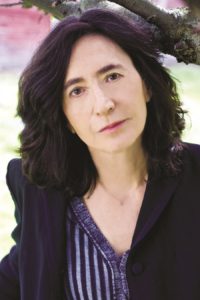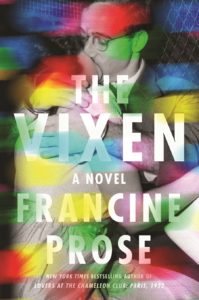Simon Putnam, the young protagonist of Francine Prose’s newest novel, The Vixen, is still figuring out who he is. Fresh out of Harvard, having studied folklore and mythology, he has landed himself a job as a junior editor at New York publishing firm Landry, Landry, and Bartlett, mostly thanks to a well-connected uncle.
But Simon can’t hold his liquor during the three-martini lunches. He falls in love with every woman he meets. He cringes recalling the moment in his job interview with his boss, Warren, when he said, “I’ve always liked books!”
Preparing for my interview with Prose, I felt a bit like Simon. I hadn’t had time to read the last third of The Vixen — with its many twists — as carefully as I would have liked. I was reminded of a scene where Prose describes the writers in Simon’s slush pile who purposely leave out or glue together pages as attention checks.

The former president of the PEN American Center, Prose is the author of 21 works of fiction, most recently Mister Monkey and the New York Times bestseller Lovers at the Chameleon Club, Paris 1932. She has also written nonfiction about Anne Frank, Caravaggio, and Peggy Guggenheim. Prose will be discussing The Vixen with historian Aaron Lecklider on Sunday, Sept. 19 at 4 p.m. as part of the Provincetown Book Festival.
The plot of The Vixen is set into motion when Simon is given his first editing assignment: The Vixen, the Patriot, and the Fanatic, a bodice ripper with Ethel Rosenberg as the unlikely protagonist. Prose artfully weaves in hilariously bad excerpts. Simon learns that the financial future of the firm rests on his ability to transform this hideous manuscript. But Warren doesn’t know that Simon’s mother knew Ethel.
This aspect of the book is loosely autobiographical, Prose says. Her mother went to high school with Ethel on the Lower East Side. “They weren’t close, and their politics were quite different,” she says. She remembers watching news of the Rosenbergs’ execution on television. “I was seven,” she says. “It was traumatic for our family.”
Though the book draws on Prose’s experiences, “It’s always very disguised,” she says. “My kids are always saying you would have to know us really well to know how much of what happens in the book really happened.”
This summer also saw the publication of a new biography of Ethel by Anne Sebba, reviewed in the Independent. “There may be an uptick in interest in the Cold War and that era because there are so many things about the ’50s that seem eerily similar to our situation,” says Prose. “The way in which people have been convicted without trial. And it ended. The McCarthy era ended. People are looking for any kind of hope.”
Prose reached out to documentary director Ivy Meeropol, the granddaughter of Julius and Ethel Rosenberg. “I was concerned how the Meeropol family would read the book,” she says. “They’re very smart — they’re readers. Her father, Michael, was laughing out loud.”

Writing The Vixen required historical research, says Prose. For example, she had to reread Njal’s Saga, the Icelandic epic that is the topic of Simon’s thesis. For Lovers at the Chameleon Club, which takes place during pre-war years in France and Germany, “I had to actually do honest-to-God research,” she says. “I don’t have the greatest memory for it. I kept forgetting what I learned. But it all just fed in there.
“It’s more fun for me to write fiction because I don’t know what’s going to happen next,” continues Prose. “With nonfiction, you do research, get material, and tell the story. There are surprises in the research, but not in the writing. When I realized that there was going to be this scene about the Jell-O box, I was ecstatic. Again, it was made up. If I were writing a real history of the role of the Jell-O box, I’d never be able to do what I did.”
With youthful audacity, I said I preferred nonfiction because it’s full of facts. “Fiction has a lot of information,” responds Prose. “The most basic information — what it’s like to be a human being — is useful. How people really were in a different time. To read something like The Vixen makes you feel less lonely in a way — part of this continuum of human life.”
Prose makes a point of reading all the reviews of The Vixen on Amazon. “I was concerned by how people would perceive a comedic book about the Rosenbergs,” she says. “Everyone I know liked the book. Why wouldn’t you? But this is a recurring thing that I’ve noticed in the reviews — how little sympathy there is for the fact that Simon is young. People say, ‘He’s so naive, he’s so wishy-washy. He can’t make up his mind.’ ”
The time right after college is one of transition, says Prose: “I was really surprised that people would not remember what it was like.”
On the Same Page
The event: Provincetown Book Festival
The time: Friday, Sept. 17 through Sunday, Sept. 19
The place: Provincetown Public Library, 356 Commercial St.
The cost: Free; full schedule at provincetownbookfestival.org
Friday
6 p.m.: Rose Dorothea Award honoring Karen Finley
Saturday
9 a.m.: “Reading Local” with Elaine Bennett, Peter Kazon, Steven Myerson, Michael Nolan, and Judith Newcomb Stiles
Noon: “Real Fiction/Real Life” with Brandon Taylor
4:30 p.m.: Robert Jones Jr. interviewed by Aaron Lecklider
6 p.m.: “Provincetown: Life at the Edge of the World” with Paul Lisicky
Sunday
4 p.m.: Francine Prose in conversation with Aaron Lecklider
